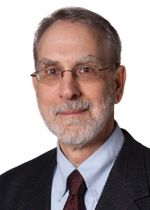
As founding director of the Northwestern University Clinical and Translational Sciences (NUCATS) Institute, Philip Greenland, MD, Harry W. Dingman Professor of Cardiology, helped launch an organization specifically designed to cultivate collaborations across Northwestern. After overseeing years of successful partnerships between University schools, the community, and Feinberg’s clinical affiliates, Greenland has indicated a wish to relinquish his role as institute director this spring.
Greenland will continue to hold the Dingman Professorship, and Donald Lloyd-Jones, MD, ScM, preventive medicine chair, will become the new director of NUCATS and the senior associate dean for clinical and translational research at the medical school.
“Establishing the NUCATS Institute was a monumental and satisfying assignment,” said Greenland, professor in preventive medicine and medicine-cardiology. “The chance to refocus on my research while still watching NUCATS continue to grow will be another exciting time in what has been a great career at Feinberg.”
Since launching in 2007, the NUCATS Institute has represented a significant collaborative effort involving faculty from six Northwestern schools, as well as four clinical affiliates. In May of 2008, Greenland became principal investigator for a $30 million Clinical and Translational Science Award (CTSA) from the National Institutes of Health – the third largest NIH award the medical school had ever received.
“Phil has done a remarkable job creating NUCATS from scratch, transforming the clinical and translational research enterprise at Northwestern, and setting the stage for a strong effort to renew the CTSA grant,” said Rex Chisholm, PhD, vice dean of scientific affairs and graduate education.
Under Greenland’s leadership, NUCATS has evolved into a successful and distinguished institute that continues to be a critical component of the Northwestern University research enterprise. Components of NUCATS, like Science of Team Science research and the Community-Engaged Research Center, now play significant roles in the development of ever-increasing collaboration at Northwestern.
“Dr. Greenland has displayed exceptional leadership in growing NUCATS into an integral part of our research initiatives,” said Eric G. Neilson, MD, Northwestern University Feinberg School of Medicine vice president for medical affairs and Lewis Landsberg Dean. “The institute has become a fundamental link in Northwestern University’s clinical and translational research enterprise by accelerating translational innovation as a member of the CTSA consortium.”
Lloyd-Jones, whom Greenland recruited from Massachusetts General Hospital in 2004, said he will continue to learn from the institute’s first and only director.
“The opportunities and environment that Phil has created for clinical and translational researchers at Northwestern, and the knowledge that he has imparted will guide my leadership of the NUCATS Institute,” Lloyd-Jones said. “I am grateful and excited to become a part of the team responsible for catalyzing health research collaborations across the University.”
After completing his undergraduate chemistry degree at Williams College in Massachusetts, Greenland earned his medical degree at the University of Rochester in New York. Previous to arriving at Northwestern in 1991 as the preventive medicine chair, Greenland was director of preventive cardiology and cardiac rehabilitation at the University of Rochester Medical Center.
“Dr. Greenland is a renowned researcher who has helped the world by exploring new realms of cardiovascular health,” said Jay Walsh, Northwestern University’s vice president for research. “The broad and deep impact of his work is fully in Northwestern’s tradition of research excellence.”
Credited with being among the first to show that cardiovascular risks after heart attack are different between sexes, Greenland’s research today focuses on three core areas – the role of traditional cardiovascular risk factors in long-term risk prediction; cardiovascular disease and risk prediction in women; and the role of cardiovascular imaging in cardiovascular risk estimation.
During his 38-year medical career, Greenland has held dozens of national and international appointments and has been frequently honored, including being named a Royal College of Physicians of London Fellow in 2008 and Feinberg Tripartite Legacy Award winner in 2011. He is the author or coauthor of more than 300 articles, book chapters, and monographs on topics related to heart disease prevention.






